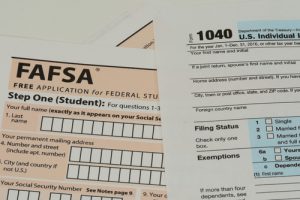
U.S. Rep. Adam Kinzinger (R-IL) on July 12 introduced a bipartisan bill that would coordinate income levels on federal financial aid for higher education with established guidelines set by the Internal Revenue Service (IRS).
The Improving Middle Class Access to Higher Education Act, H.R. 6349, would help more middle class families and students quickly fill out the Free Application for Federal Student Aid (FAFSA) by aligning the income levels on the FAFSA Simplified Needs Test with those already used by the IRS, according to a statement from Rep. Kinzinger’s office.
“As our economy continues to grow and unemployment falls, businesses are clamoring for skilled workers to fill open jobs,” the congressman said. “Getting more Americans the education and training they need to fill these jobs is crucial to creating a 21st Century workforce and I’m proud that my bill … will remove a burdensome barrier for middle class students filling out the FAFSA.”
If enacted, H.R. 6349 would amend the Higher Education Act of 1965 to increase the FAFSA income limit of the Simplified Needs Test from $50,000 to $100,000, according to the draft text of the bill in the congressional record.
The measure’s proposed amendments would take effect with respect to award year 2018-2019, and each succeeding award year, according to the draft text.
“Education is a crucial opportunity, and this legislation is one step we can take in Congress to help more Americans achieve a brighter future,” Rep. Kinzinger said.
H.R. 6349 has bipartisan support from original cosponsors U.S. Reps. Claudia Tenney (R-NY) and Joyce Beatty (D-OH) and has been referred to the U.S. House Education and the Workforce Committee for consideration.



